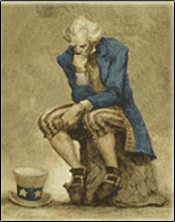
–>
June 5, 2023
The almost subliminal message in the afterward of several editions of 1984 is a stark warning on what the globalist left wants to do to liberty.
‘); googletag.cmd.push(function () { googletag.display(‘div-gpt-ad-1609268089992-0’); }); document.write(”); googletag.cmd.push(function() { googletag.pubads().addEventListener(‘slotRenderEnded’, function(event) { if (event.slot.getSlotElementId() == “div-hre-Americanthinker—New-3028”) { googletag.display(“div-hre-Americanthinker—New-3028”); } }); }); }
If you buy a copy of a certain paperback edition of George Orwell’s most famous work you can be witness to one of the fascist far left’s first attempts at rewriting history in an afterword to a book that warned of the danger of rewriting history. You’ll have to look at the listing of the book title and authors to see if it includes: Erich Fromm (Afterword). However, it’s also available from here, here, here, here, or you can request a copy of the document here.
 When you read George Orwell’s later works, you will note a great amount of disdain for socialism, even if this wasn’t always the case. Apparently for the far left, once you’re a socialist, you’re always a socialist.
When you read George Orwell’s later works, you will note a great amount of disdain for socialism, even if this wasn’t always the case. Apparently for the far left, once you’re a socialist, you’re always a socialist.
The afterword was written by Erich Fromm, a socialist and political activist from the infamous Frankfurt School that spawned Critical Theory. So, while George Orwell was warning against collectivist authoritarianism, Erich Fromm was advocating for it. It wasn’t exactly an unbiased commentary by any means.
‘); googletag.cmd.push(function () { googletag.display(‘div-gpt-ad-1609270365559-0’); }); document.write(”); googletag.cmd.push(function() { googletag.pubads().addEventListener(‘slotRenderEnded’, function(event) { if (event.slot.getSlotElementId() == “div-hre-Americanthinker—New-3035”) { googletag.display(“div-hre-Americanthinker—New-3035”); } }); }); }
The supremely ironic passage is found midway in the 6th paragraph of the piece. We’re presenting it in context so you can see how it’s almost a subliminal message:
This hope for man’s individual and social perfectibility, which in philosophical and anthropological terms was clearly expressed in the writings of the Enlightenment philosophers of the eighteenth century and of the socialist thinkers of the nineteenth, remained unchanged until after the First World War. This war, in which millions died for the territorial ambitions of the European powers, although under the illusion of fighting for peace and democracy, was the beginning of that development which tended in a relatively short time to destroy a two-thousand-year-old Western tradition of hope and to transform it into a mood of despair. The moral callousness of the First World War was only the beginning. Other events followed: the betrayal of the socialist hopes by Stalin’s reactionary state capitalism; the severe economic crisis at the end of the twenties; the victory of barbarism in one of the oldest centers of culture in the world—Germany; the insanity of Stalinist terror during the thirties; the Second World War, in which all the fighting nations lost some of the moral considerations which had still existed in the First World War.
Did you catch that?
“The betrayal of the socialist hopes by Stalin’s reactionary state capitalism;”
The nearly subliminal sentence goes by quickly, along with the subsequent criticism of socialist terror techniques, but by then the idea that Stalin was supposedly ‘reactionary’ or ‘right-wing’ had already been planted in the mind of the reader.
“the insanity of Stalinist terror during the thirties;”
‘); googletag.cmd.push(function () { googletag.display(‘div-gpt-ad-1609268078422-0’); }); document.write(”); googletag.cmd.push(function() { googletag.pubads().addEventListener(‘slotRenderEnded’, function(event) { if (event.slot.getSlotElementId() == “div-hre-Americanthinker—New-3027”) { googletag.display(“div-hre-Americanthinker—New-3027”); } }); }); } if (publir_show_ads) { document.write(“
Now take apart the nearly subliminal message and apply the appropriate definitional context.
‘betrayal of the socialist hopes’ This sets up the promulgation of the falsehoods in the later half of the sentence as well as further on in the piece.
The Merriam-webster dictionary definition of the word betrayal spells it out:
2: to deliver to an enemy by treachery.
Synonyms of: backstab, cross, double-cross, sell (out), two-time, go back on, sell down the river, stab in the back.
The author is trying to pin the failures of ‘socialist hopes’ on Stalin, because of his betrayal. Do you see the massive lie that is being perpetrated? It wasn’t that socialism is a failed ideology, it was because of Stalin.
With the unspoken implication that it would have worked if it hadn’t been for him. We’ll get to why this is the case in a second.
Even as early as 1961 it was entirely apparent that socialism had failed to meet its ever-lofty promises in the former ‘Soyuz Sovetskikh Sotsialisticheskikh Respublik’ Union of Soviet Socialist Republics. The same can be said for the Nationalsozialistische Deutsche Arbeiterpartei National Socialist German Workers’ (Nazi) Party.
In both cases, we see how the fascist far left executes their biggest lies. Claiming that a collectivist, far-left authoritarian regime is based on liberty and limited government from the opposite end of the political spectrum. It sounds ridiculous when it’s stated that way, but leftists also love to repeat their lies over and over until they become the truth, something both Vladimir Lenin and Adolf Hitler’s propaganda minister Joseph Goebbels both advocated. Imagine that, it’s almost as if leftists are the same the world over.
Whenever socialist regimes fail, they magically become ‘right-wing’ somehow.
This massively big lie lets the far-left claim that ‘socialism has never really been tried before.’ They’ve even gone so far as to state: Republicans claim to fear left-wing authoritarianism — but there’s no such thing. That classic big lie from Salon is an ideological descendant from the 62-year-old afterword, it just had to make the lie even bigger because of socialism’s abject failures in the interim. Sidenote: Be sure to copy that article to a CD and print it out for the future, you’ll never know when that piece might find its way to the ‘memory hole.’
Then there is this part that tries to invert reality: Stalin’s reactionary state capitalism
For those unfamiliar with leftist dog whistle language, ‘reactionary’ is synonymous with ‘right wing’
From the Merriam-webster dictionary definition of the word reactionary
Synonyms: archconservative, conservative, ultraconservative, unprogressive
Strangely enough, after setting up the big lie and claiming Stalin was a ‘conservative’ he throws a curve ball with the phrase ‘state capitalism,’ defined by the Merriam-webster dictionary as:
…an economic system in which private capitalism is modified by a varying degree of government ownership and control
However, this is a comparison to full-blown communism, so in that context, it was probably too much of a stretch to claim that it was economic liberty – that would have raised alarms with everyone as an outright lie.
Thus, to summarize we have one of a nation’s prominent socialists claiming that Stalin was ‘conservative’ and he had ‘betrayed’ collectivist dogma with the implication that was why even then the Union of Soviet Socialist Republics was failing to become the ever-vaunted “worker’s paradise” or as The People’s Cube calls it “The Glorious World of Next Tuesday!”
Keep in mind that according to the far left, a communist all-powerful authoritarian government that controls everything is supposed to ‘wither away’ leaving a perfect ‘Utopia’ where everyone shares everything and everything is perfect. And if you believe that, we can get you a good deal on the Golden Gate Bridge.
Why is this important?
For the far left, their collectivist ideologies cannot fail. Meaning that when that inevitably happens, it must be blamed on the pro-freedom right so that their system can rise again and they can parrot the tired old line that ‘socialism has really been tried before.’
We know this is a total lie, attempts at implementations of collectivist ideologies have been failing for 400 years. And they will always fail, as they are doing now. But if the fascist far left can impose a global regime of collectivism on the world, liberty, true liberalism, and conservatism will never be able to challenge that regime with the truth.
D Parker is an engineer, inventor, wordsmith, and student of history, the director of communications for a civil rights organization, and a long-time contributor to conservative websites. Find him on Substack.
<!–
–>
<!– if(page_width_onload <= 479) { document.write("
“); googletag.cmd.push(function() { googletag.display(‘div-gpt-ad-1345489840937-4’); }); } –> If you experience technical problems, please write to [email protected]
FOLLOW US ON
<!–
–>
<!– _qoptions={ qacct:”p-9bKF-NgTuSFM6″ }; ![]() –> <!—-> <!– var addthis_share = { email_template: “new_template” } –>
–> <!—-> <!– var addthis_share = { email_template: “new_template” } –>





